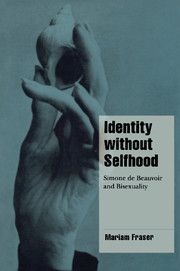2 - Identity and embodiment
Published online by Cambridge University Press: 27 October 2009
Summary
I have illustrated already that Foucault ‘does not write a history of subjects but of processes of subjectivation’ (Deleuze 1988: 116). Hence the notion of the ‘subject’ does not refer to a fixed or static entity but rather to a ‘practice of being’, a production enabled by techniques which do not remain consistent over cultures or through history. As such, Foucault's genealogy provides a useful tool with which to explore the minefield of contemporary theories of the self, and their implications, while simultaneously avoiding the temptation to offer yet another ‘“just so story” of how the human being got its individuality’ (N. Rose 1996: 301). With this in mind, and drawing principally on Foucauldian themes which have been taken up and adapted by feminist theorists, this chapter will examine the extent to which questions of sexuality have become caught up with questions of how the self acquires individuality.
Just as the theoretical reflections which will be outlined below both recognise the individuality of the self and also work against it, so this study will be concerned both with the ways that representations of de Beauvoir ascribe individuality to her – which, by implication, indicates that individualisation is constitutive of intelligible selfhood (Strathern 1992; Haraway 1991) – and also with the way that techniques of the self, particularly that of individuality, may preclude the possibility of de Beauvoir being perceived as a ‘bisexual individual’. In this respect, the following analysis of de Beauvoir and of bisexuality would be impossible without, and is indebted to, feminisms and queer theories which have opened up the relation between an individual and its identity in order that all three (the individual, the identity and the relation between them) are available as a site of political contestation.
- Type
- Chapter
- Information
- Identity without SelfhoodSimone de Beauvoir and Bisexuality, pp. 25 - 46Publisher: Cambridge University PressPrint publication year: 1999



